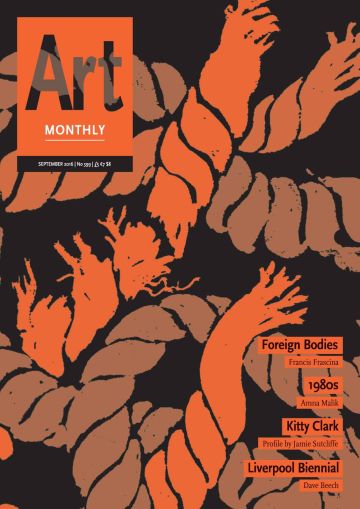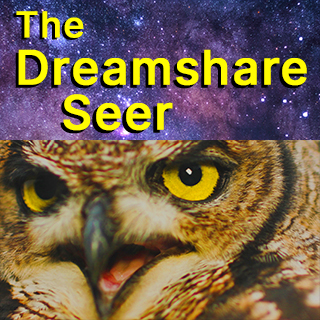Art Monthly 399
September 2016
Foreign Bodies
Francis Frascina
1980s
Amna Malik
Kitty Clark
Profile by Jamie Sutcliffe
Liverpool Biennial
Dave Beech
Buy Now – select:
Want to read this right now?
Get instant access to the entire back catalogue via Exact Editions from only £8.99!
Contents
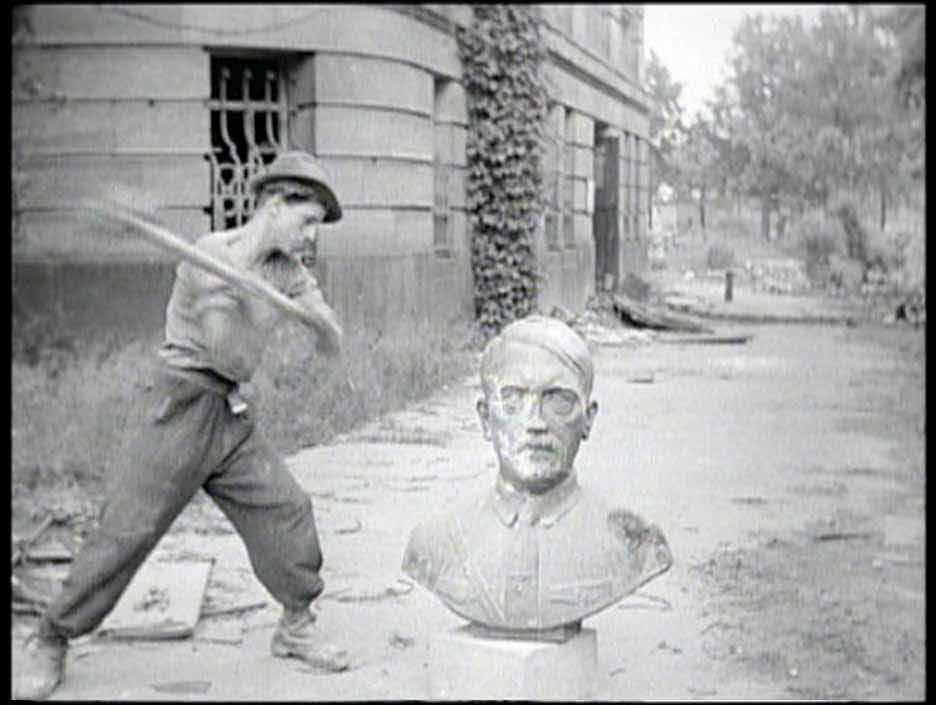
Lars Laumann Kari & Knut 2010 video
Feature
Foreign Bodies
Francis Frascina on Brexit, the body and the workings of the state
Fallout from the EU referendum casts work by Mona Hatoum, Lars Laumann and Trevor Paglen in a new light.
Plague metaphors to demonise otherness as a transforming foreign body, a cancerous 'enemy within' or invasive 'enemy without' have been mobilised by leaders of nation states keen to obscure their own agendas.
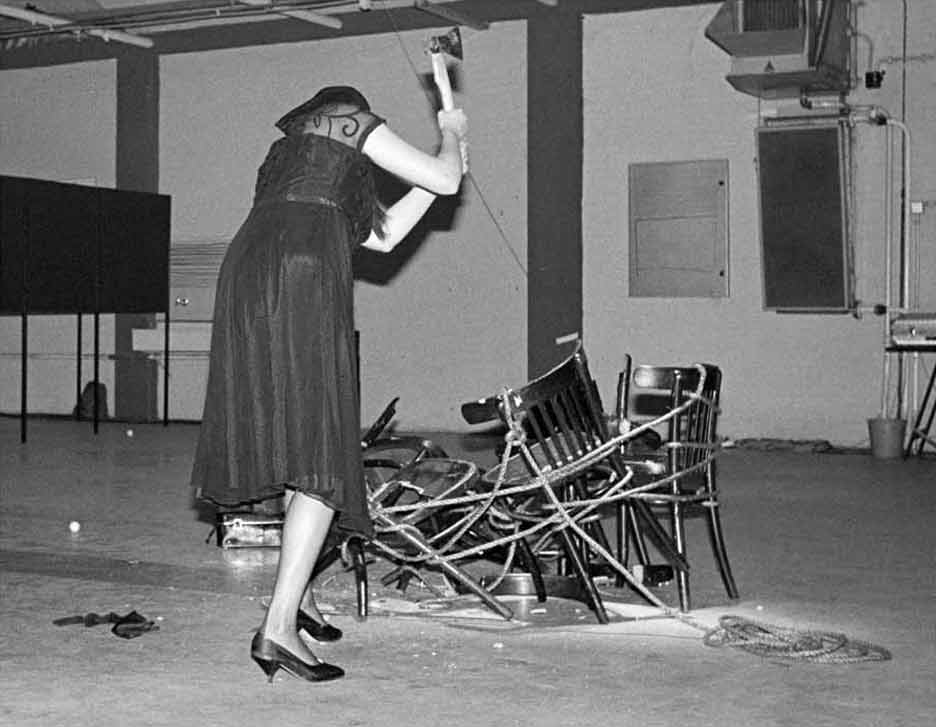
Moniek Toebosch And this ladies and gentlemen was the destruction of six Thonet-chairs tied with a rope into a circle and several eggs 1984 performance
Feature
1980s
Amna Malik on viewing the past through the eyes of the present
A challenging exhibition offers an opportunity to re-examine the origins of globalisation and the myth of inclusion which has been shattered by the result of the EU referendum.
If the mantra of inclusion is the myth perpetuated by globalisation then this myth has been shattered by the results of the EU referendum, exposing tensions that have long been in existence but predictably only capitalised by the far right. The needs of capitalism have forced this mantra to become a branding of modernity, whereby the historic tensions of difference are conveniently elided rather than thought through and fought through.
Comment
Editorial
Here Today Gone Tomorrow
Former tax manager for corporate giant KPMG, Karen Bradley, is the latest culture secretary in a long undistiguished line. In Conservative governments it seems to be a prerequisite for the job that the incumbent should have no interest or experience of working in the arts.
The phrase 'here today gone tomorrow' comes forcibly to mind as the art world comes to terms with yet another obscure culture secretary with no background or declared interest in the arts.
From the Back Catalogue
Art Capital Simon Ford and Anthony Davies explain the surge to merge culture with the economy
Artnotes
Austerity Double Plus
The EU referendum result throws government and EU arts budgets into doubt; post-Brexit, the DCMS tries to gee-up the creative industries; the schools minister gets creative with statistics in Parliament's EBacc debate; Theresa May shuffles the DCMS ministerial pack; artist Gordon Shrigley is barred from the Labour Party; Peter Doig is dragged into court by a prison officer; Orlan's lawsuit against Lady Gaga is thrown out of court; an elderly visitor reworks a German museum's Fluxus artwork; Space's vision for a production corridor between London and Essex takes shape; ACE hands out dozens of grants to support arts philanthropy; the latest news on galleries, appointments, prizes and more.
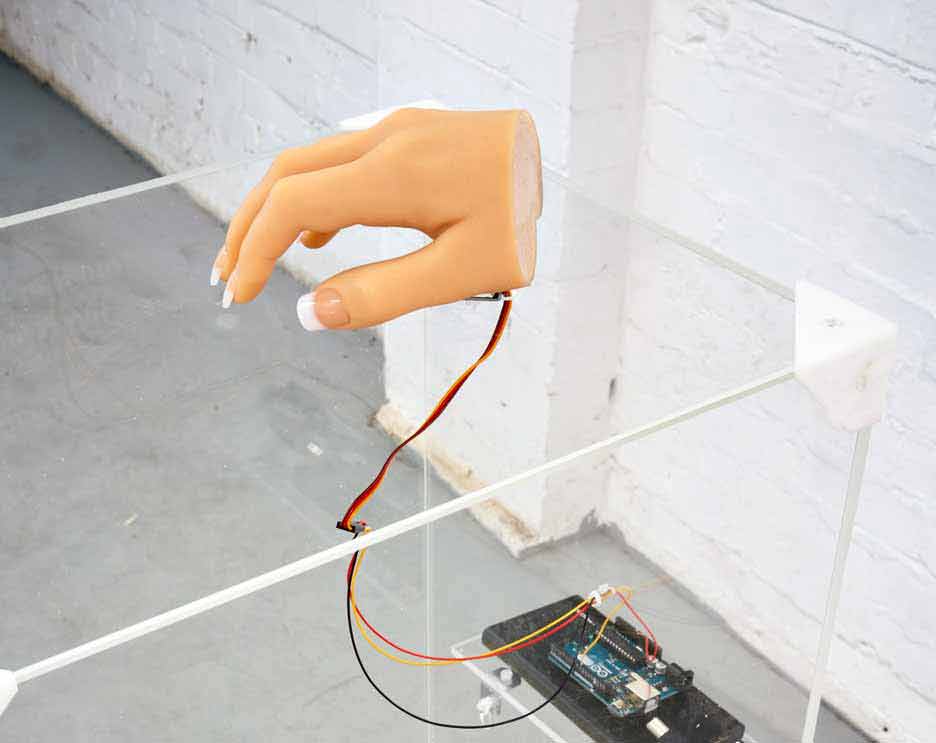
Kitty Clark My Love (The Idol Woman) 2016 detail
Profile
Kitty Clark
Jamie Sutcliffe on the London-based artist who explores our relationship with sentient and sensual bots.
Kitty Clark's early work betrayed her concern with an artificiality striving for similitude with its range of wishful objects: a plastic fern spritzed with 'real fern scent', for example, or an almost too perfect lettuce sandwich fashioned in corrugated PVC.
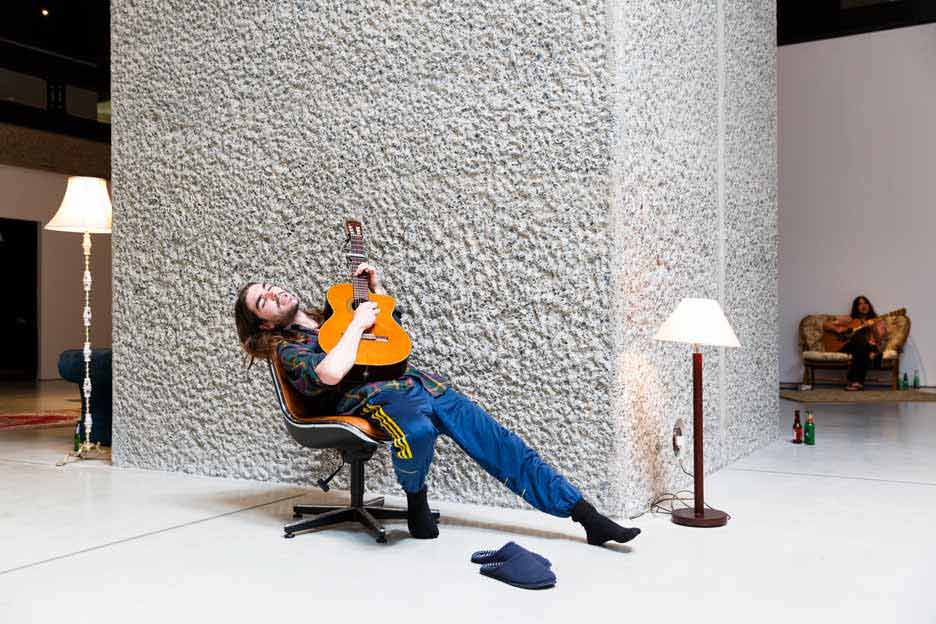
Ragnar Kjartansson Take me here by the Dishwasher: Memorial for a Marriage 2011-14 at the Barbican
Exhibitions
If All Relations Were to Reach Equilibrium, Then This Building Would Dissolve
MIMA, Middlesbrough
Paul Usherwood
Under the Same Sun: Art from Latin America
South London Gallery
Gabriela Salgado
Edinburgh Art Festival
various venues
Rosie Lesso
Liverpool Biennial 2016
various venues
Dave Beech
Bloomberg New Contemporaries
Bluecoat, Liverpool
Martin Herbert
David Hammons: Give Me a Moment
George Economou Collection, Athens
David Gleeson
Marc Camille Chaimowicz and Bruno Pélassy: Tears Shared
Flat Time House, London
Tim Steer
Found
Foundling Museum, London
Julie Hrischeva
In a Dream You Saw a Way to Survive and You Were Full of Joy
Whitworth, Manchester
David Lillington
Yorkshire Round-up
Hepworth Wakefield • Leeds College of Art • S1 Artspace
Tom Emery
London Round-up
Pump House Gallery • Laure Genillard • Barbican
Kathryn Lloyd
Paris Round-up
Centre Georges Pompidou • Jeu de Paume • Palais de Tokyo
Anna Dezeuze
Reviews
Books
Documentary Across Disciplines
Alex Fletcher on heterogeneity in documentary practices
John Grierson, credited with coining the term in 1926, famously defined documentary as the 'creative treatment of actuality', consequently signalling an ambivalent tension between non-fiction and its shaping.
Reviews
Film
Laura Mulvey & Peter Wollen: Beyond the Scorched Earth of Counter-Cinema
Alex Fletcher revisits the film theorists' own films
Laura Mulvey and Peter Wollen's third and fourth films, Amy!, 1980, and Crystal Gazing, 1981, are, as Esther Leslie noted, marked by a period of defeat, with Margaret Thatcher coming to power in 1979 and the radical film tradition coming to an end.
Reports
Letter from Chicago
North and South Sides
Omar Kholeif finds purchase on the US Third Coast
For all of its visceral visuals, Chicago is perhaps unusual among many US cities for its social and civic consciousness.
Letter from Moscow
Hidden Histories
Chris McCormack on art and Russian capital
If the flurry of recent headlines has jolted the west into reliving Cold War anxieties, cultural organisations inside Russia have responded largely by pitting allegory and dissimulation against these ever-shifting realities.
Letter from Los Angeles
In Search of the Real
Lee Foley on the tensions around an expansionist art scene
The message from local organisers was clear: though they are not anti-art, they are staunchly anti-gallery.
Artlaw
Public Policy
The Code of Art
Henry Lydiate on an Australian experiment in art-dealer regulation
In the primary-sales market place, dealers and collectors are vastly fewer than the thousands of artists and millions of available artworks ripe for 'development' and, some might say, manipulation.
Listings
Events
Calendar
The updated events and exhibitions calendar can also be viewed online.
Exhibitions
Exhibition Listings
Art Monthly's exhibition listings can be viewed online.

